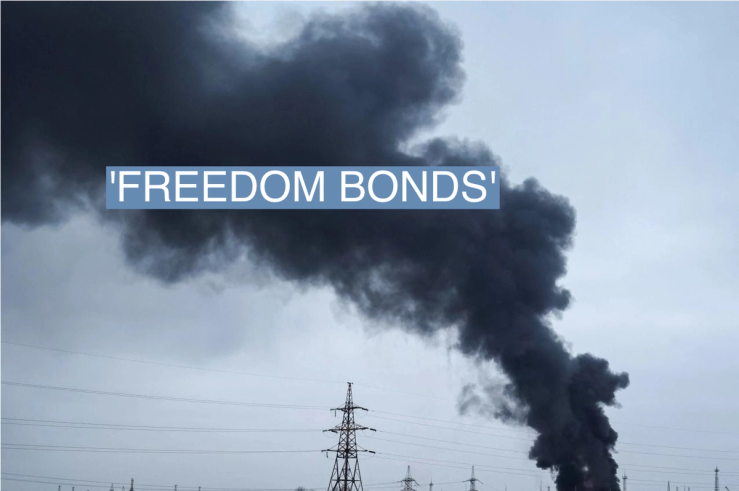The News
The U.S. has proposed that the Group of Seven industrialized nations issue at least $50 billion in bonds to support Ukraine’s war effort, backed by frozen Russian assets, Bloomberg reported.
The so-called freedom bonds would allow investors to loan Kyiv much-needed cash safely and at favorable interest rates.
The bonds would be backed by billions in interest generated by the $280 billion in Russian central bank assets lying frozen in financial institutions in G7 countries and the European Union — which some EU countries have said should be seized outright.
The G7 initially said those assets would stay frozen until Russia agrees to pay Ukraine back for the extensive damage its war campaign has caused. People familiar with the proposal told Bloomberg that discussions over the bond idea are still in early stages.
The proposal comes as the U.S. struggles to send funding to Kyiv, with a $60 billion aid package still held up in Congress.
While the bulk of frozen Russian assets are stored in the EU, the U.S. holds about $5 billion-worth, and President Joe Biden has backed a bill to allow the U.S-based assets to be seized and used to help Ukraine. Biden has told allies he wants to have made progress on a plan to use the assets by June, when the G7 summit will take place in Italy.
War bonds are an old idea; the first government bond ever issued was issued by the Bank of England in 1694 to support one of the country’s wars against France. During World War II, 85 million Americans raised $185 billion via the securities.
SIGNALS
If West doesn’t seize assets, war bonds are the next-best option
European leaders are nervous about Biden’s calls to seize Russian assets, concerned that such a move would spur legal action and other retaliation from Russia. Barring that option, two economists wrote for the Financial Times, war bonds are the best path. If such a strategy were employed, they wrote, “every bomb, missile or drone Putin launches towards Ukraine would effectively also be blowing up Russia’s wealth while providing Kyiv with funding to resist and recover from the onslaught.”
War bond effort hasn’t gotten much traction with EU members, but plan for arms fund gains speed
While Belgium and the U.S. support the war bonds effort, EU member states including Germany and France oppose the idea of creating a new investment vehicle using the frozen assets, Reuters reported. “It’s a Belgian test balloon,” one diplomat told the news agency. “It hasn’t gotten much traction thus far.”
However, EU leaders have agreed to work on a plan to use the proceeds of the assets in a different way, by setting up a fund to buy arms for Ukraine.
“I believe that what we will do is to use [the money] directly and not to develop new vehicles now. In any case, this has not played a role in the debates here,” Reuters reported the German Chancellor Olaf Scholz as saying after an EU summit.
Moscow has warned that any confiscation of its assets or their proceeds would be theft, and would bring “catastrophic consequences” for banks.



